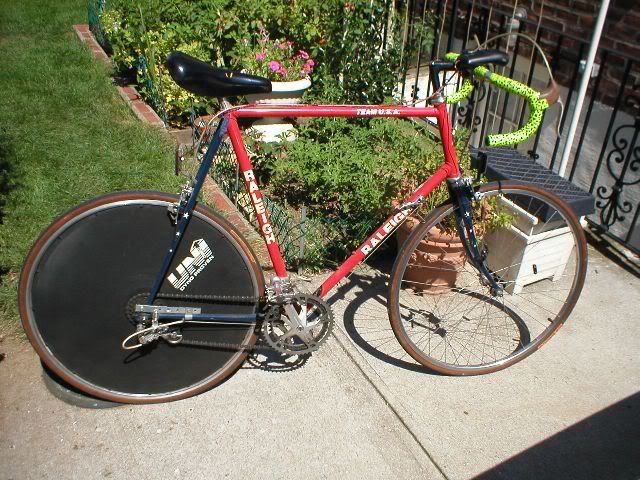Good article:
http://www.caranddriver.com/columns...rate-average-fuel-economy-law-is-d-u-m-b.html
IMO: Higher gas taxes and use of alternative energy sources are the only useful way to address our consumption problem in the US.
http://www.caranddriver.com/columns...rate-average-fuel-economy-law-is-d-u-m-b.html
IMO: Higher gas taxes and use of alternative energy sources are the only useful way to address our consumption problem in the US.
BY CSABA CSERE, June 2007
Now that gasoline prices are rising again and Al Gore has proven the existence of man-made global warming by winning an Academy Award for his documentary, An Inconvenient Truth, and even George Bush is talking about reducing energy usage, there’s much talk in the halls of Congress about tightening up the CAFE law.
Most of you know CAFE stands for “corporate average fuel economy,” a law setting minimum average fuel-consumption levels for cars and trucks sold in America. The law has been in effect since 1975, two years after the first U.S. fuel crisis. Since 1985, the law has required that an automaker’s line of cars average 27.5 mpg. The current truck standard of 22.2 mpg was raised 1.5 mpg over the past three years.
Now Congress wants fuel-economy averages raised much higher. A group of senators led by California’s Dianne Feinstein wants to bump both the car and truck standards to 35 mpg by 2019. Sen. Dick Durbin of Illinois went even farther, proposing last year to raise CAFE for all vehicles to 40 mph by 2016.
But there’s a problem. CAFE has always been a dumb law that’s not only wrong-headed but also doomed to fail. Here are my top 10 reasons why CAFE standards make no sense:
1. CAFE laws do absolutely nothing to reduce fuel consumption in the short term. Because increased CAFE standards only affect the fuel efficiency of vehicles yet to be made, they have no effect on the fuel used by America’s existing fleet of 247 million vehicles.
2. By making driving less expensive, higher CAFE levels actually encourage more driving. Bump an SUV’s fuel economy from 20 mpg to 40 mpg, and you reduce the cost of gasoline (at $2.40 a gallon) from 12 cents to 6 cents a mile. Uh-huh, that’s really going to encourage less driving.
3. Because CAFE laws make driving cheaper, they do nothing to foster the use of public transportation or encourage housing choices that reduce commuting distances.
4. CAFE laws put the entire burden of fuel and carbon conservation on cars and ignore industry sources, home energy use, airlines, agriculture, trucking, locomotives, etc. Yes, cars and trucks do consume a great deal of energy, but of America’s total energy consumption of about 100 quadrillion BTUs (in 2005), the vehicles affected by CAFE only account for some 18 percent of that total. That’s not much more than the 14 percent of our energy that is generated by nuclear and renewable sources. Doesn’t the CO2 produced by the other 68 percent also cause global warming? Why should SUVs be demonized when Al Gore, in the largest of his three homes, uses 20 times as much electricity as I do in my not-insubstantial house? Meanwhile, other energy-conservation advocates jet around in Gulfstream 5s that burn 17 times as much fuel as an Escalade does getting from Los Angeles to San Francisco.
5. CAFE puts the burden on automakers to produce products that buyers don’t necessarily want. Last year, when gas prices went over $3 a gallon, Americans, for the first time in nearly five years, started buying more cars than trucks—at least for five months. By February of this year, after gas prices dipped in the low $2 range, trucks once again were outselling cars, by 20 percent. Forcing manufacturers to sell fuel-efficient vehicles in America without the encouragement of high fuel prices is like trying to make steakhouses sell tofu-fillet sandwiches for the same price as a chateaubriand.
6. CAFE laws imply that Americans can continue to drive the vehicles they want, if only the stingy automakers would spend a few more pennies on efficient technologies to improve vehicle mileage. Not only is this nonsense, but it also denies the reality that major reductions in energy consumption will require changes in the habits and lifestyles of most Americans.
7. Because CAFE increases keep gasoline costs low, buyers have no reason to invest in energy-saving technologies, such as lightweight materials, that would actually improve efficiency.
8. CAFE puts the burden on car manufacturers to reduce consumption rather than on the drivers who actually burn the fuel for their own benefit. It’s like those lawsuits that sought to blame McDonald’s because the food its customers bought and ate of their own free will made some of them fat.
9. CAFE laws create unanticipated distortions in the market, such as the rise of SUVs to replace station wagons, the EPA labeling of cars such as the Dodge Magnum and Subaru Outback sedan as trucks, and the enlargement of trucks to get them out of the CAFE pool. Selling more vehicles with gross vehicle weight ratings of more than 8500 pounds sure saves fuel.
10. Finally, CAFE will accomplish nothing because its glacially slow effects are offset by the growth of trucks in the U.S. vehicle fleet. For example, if the Feinstein bill to raise both car and truck CAFE to 35 mpg by 2019 were enacted, fuel use by America’s vehicles would not decrease at all, as the CAFE gains would be more than offset by the inexorably increasing number of cars and trucks (about four million vehicles annually) and the increasing proportion of trucks on the road.
The bottom line is that CAFE doesn’t save any fuel because it fails to motivate drivers to worry about fuel economy. Anyone who professes to be worried about conservation and thinks the solution can be found in some version of CAFE law is too simple to understand the problem, too cowardly to ask voters to make some sacrifices, or sufficiently cynical to promote a law that accomplishes nothing other than capturing self-aggrandizing headlines.


